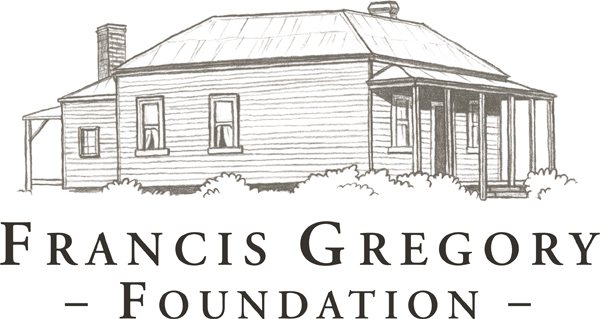ABOUT THE FOUNDATION
The Francis Gregory Foundation was established by June Harvey, granddaughter of the late Francis Gregory. Scholarships bequeathed by the Foundation provide assistance to children of farming families seeking to pursue university education—particularly students who may not have this opportunity without financial support.
The Foundation’s funds were derived from the sale of the Gregory farm at Lardner, as selected by Francis in 1875. June herself would not have been able to attend university if not for the Secondary Studentship Scheme, which was in operation when she was young. Like many other farmers, her parents had assets in their farm; however, money was not readily available to meet the costs of a university education, especially when this entailed living away from home. June’s wish is to provide scholarships to Year 12 students from families engaged in primary production who may not otherwise be able to continue on to tertiary education.
The first Francis Gregory scholars were selected in 2013 and commenced their studies in 2014.
Francis’s Lardner Legacy
Francis Gregory was born in London on 19 October 1835, the only known child of Harriet Gregory, whose family came from White Waltham in Berkshire. He married Harriet Huse in 1859 in Wokingham, Berkshire. After being advised by his doctor to move to the warm, sunny climate of Australia, he emigrated with his wife and two children, Robert and Sarah, on the ship the Forest Right, arriving in Melbourne in January 1865.
After living in Melbourne for ten years, Francis joined the land rush to the virgin forests of Gippsland, selecting the land at Lardner that was to become his home. He was one of the first settlers in the district when he arrived, naming his new property Hawthorn Grange.
By 1876, he’d established the Lardner Butchery, which served settlers as far as Drouin South, Ellinbank, Poowong, Warragul and Drouin. Cattle was slaughtered on the property, and meat transported by packhorse along ‘roads’ that were, at the time, merely tracks through the forest. Francis was an impeccable record-keeper and consummate businessman. Importantly, however, he was also considered a compassionate and hospitable man who never had a bad word to say about anyone.
Harriet and Francis had eight more children after arriving in Australia—Alice, Henry, Maude, Harriet, Frederick, Emily, John and Julia, who was the only one born at Lardner.
While Francis managed the butcher's shop—with his sons’ help, as they grew older—those at the Lardner farm were also working to clear the land, and planting grass and crops. They milked cows, sending butter to Melbourne; and Francis also managed the Lardner Post Office.
Francis passed away in 1896. He was buried in the Warragul Cemetery. His widow and family carried on the butchery and Post Office until the early 1900s. The farm then became a mixed dairy and beef cattle property until the mid-1940s, when it was set up as a working dairy farm.
Francis’s youngest child, Julia, had a daughter, June, who eventually inherited the farm after her mother passed away. The dairy farm remained operational until 2012, when the farm was sold and passed out of the Gregory family after 137 years.
A section of an early Parish of Warragul map showing the Gregory property.
The former butchery photographed in 2012.


